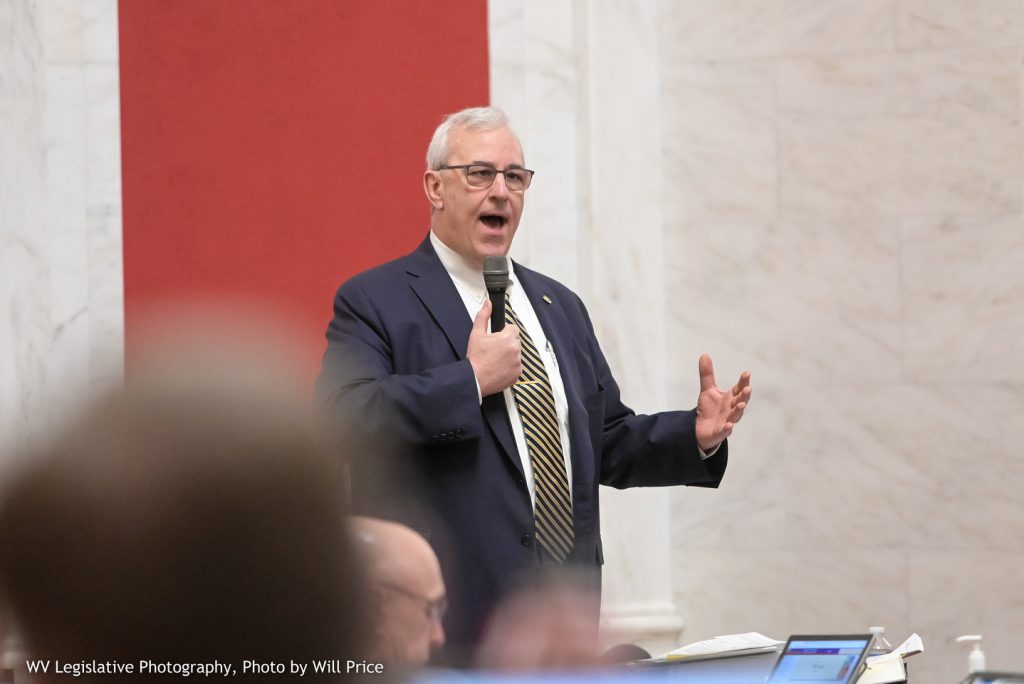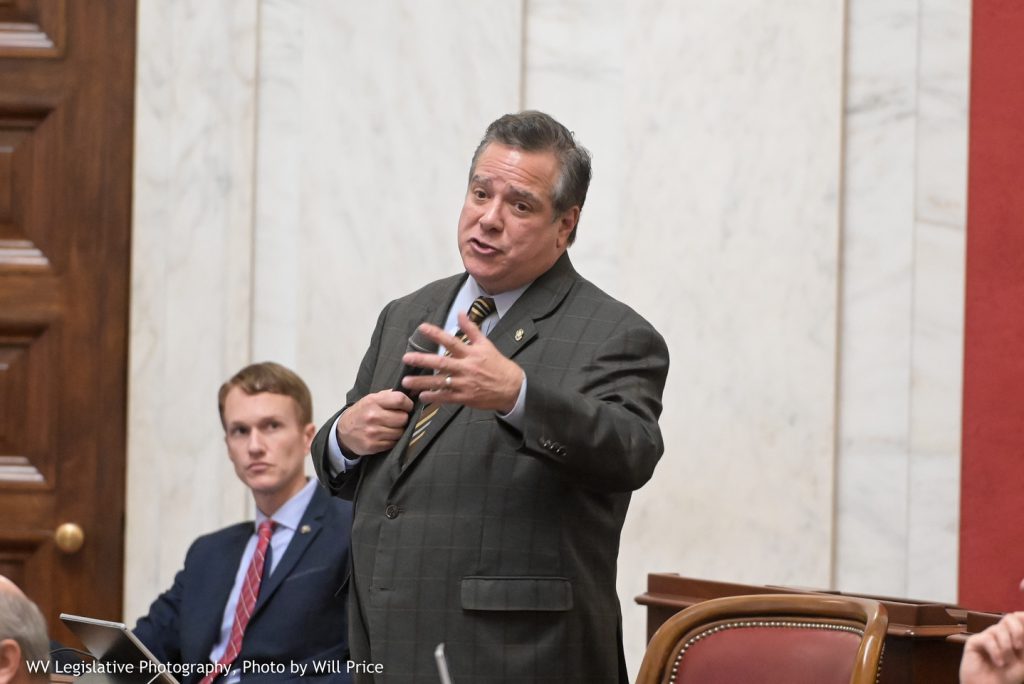Senate Bill 266 Narrowly Passes Senate
Legislation intended to create an Intermediate Court of Appeals narrowly passed the Senate with a 17-16 vote, Monday.
If passed into law, Senate Bill 266, would ultimately establish an additional layer to the state’s existing court through an Intermediate Court of Appeals.
“West Virginia is one of only 11 states who currently doesn’t have an Intermediate Court of Appeals,” Senate Judiciary Chairman Sen. Charlie Trump, stated. An advocate for the legislation, the Morgan County Senator believes an intermediate court could strengthen the state’s overall court system. “(The court) would be an important tool used to expedite the appellate review of many cases.”

Following the bill’s introduction on Jan. 11, Senate Bill 266 was placed on the Senate Judiciary agenda for Jan. 25. In a presentation offered by counsel, members first learned specific details of the potential court which would be statutorily created and operable on July 1, 2020. Counsel stated following revisions of the introduced legislation, the court would be operated by three appointed judges, all of which would be nominated by the governor and passed through advice and consent of the Senate.
Serving as a new court system, the Supreme Court of Appeals would be designated to serve as the administration over the intermediate court and have the constitutional authority to promulgate all rules of practice and procedures.
Senate Bill 266 further explains the court’s appellate’s jurisdictions would lie within giving final orders or decisions to: circuit courts in civil cases, circuit courts in guardianship and conservatorship cases, family courts, administrative agencies and the Worker’s Compensation Board of Review. In order to have a case come before the intermediate court, the bill explains that a filing would have to be completed through the Supreme Court clerk’s office, and a $200 filing fee would have to be paid; filing fee proceeds would then be deposited in the West Virginia State Police Forensic Laboratory.
Currently, the bill lists the court’s jurisdictional limitations relating to: criminal proceedings, juvenile proceedings, child abuse and neglect proceedings, mental hygiene proceedings, cases involving challenges to election practices, appeals from the Public Service Commission, extraordinary writs, interlocutory appeals and certified questions.
Although the bill establishes a middle ground of power for the intermediate court, Sen. Mike Romano, D-Harrison, a practicing lawyer in his daily life, expressed his opposition to the bill, which he believes would “add an unnecessary layer to the state’s government.”

“This is the fifth time we’ve tried to pass this bill, and there’s not been a single reason that anybody has testified to the creation of this new layer of government,” Romano said. “This would make lawyers way more money but it’s going to cost small businesses a lot more money. It’s going to cost our individual folks who are out there and have been injured or cheated a lot more money.”
The senator further explained that although the legislation seeks to broaden the scope of jurisprudence, he believes the state’s Supreme Court has actually been hearing fewer cases than years prior and raised concern as to why the Legislature is still seeking to expand the state’s court system.
Sen. Trump argued that if passed, Senate Bill 266 also would give the court a broader base of jurisprudence and flexibility to address the state’s appeals, no matter the decision.
“There are many legal questions in West Virginia that our Supreme Court can’t answer or develop now because they have themselves strapped to a rule change they made in 2010,” Trump said.
This change in rule, which arose out of a decision from the state’s Supreme Court in 2010, states that the Supreme Court could promulgate the Revised Rules of Appellate Procedure to govern that all appeals from orders entered on or after December 1, 2010 would have to come before the state’s Supreme Court.
The ultimate goal of the legislation would be to add an additional layer to the current court system and change the flow of which appeals move through the state’s courts. Currently, cases decided by the state’s smaller courts must receive mandatory review from one of three upper courts in the state prior to coming before the Supreme Court; cases decided by administrative agencies receive decisions from the Kanawha County Circuit Court; the Office of the Judges cases currently receive their decision from the state’s Workers Compensation Board of Review.
By providing an additional layer to the state’s existing court system, the intermediate court would stand as a mandatory buffer between the upper courts and the state’s Supreme Court. The main responsibility being to issue written decisions – a decision which constitutes binding precedent for lower courts. The intermediate court would also aim to assist the Supreme Court in hearing more cases, leading to more time for the Supreme Court to focus on signed decisions.
Last year saw a drop in signed decisions offered by the Supreme Court with 48 fewer decisions than the previous year. These decisions, which are regarded as having high precedent are delivered by a justice and create new point(s) of law.
Despite the intermediate court’s ability to aid in signed decision, Romano said the fiscal impact of the proposed legislation wouldn’t be worth the establishment of a new court system. While on third reading, the senator from Harrison further explained that although the total cost of West Virginia’s proposed intermediate court has gone down as a result of a reduction in judges, he believes the total cost currently doesn’t account for other staff members who will be employed by the courts.
The bill lists the annual salary for the three judges which is to be established at $130,000 per year in addition to retirement benefits; salaries and costs were included in the appropriation for the Supreme Court of Appeals according to council.
Judges who are appointed to the court will be expected to serve 10-year terms with an exemption concerning initial appointment, a process which would establish staggered terms. The legislation explains if a judge were to leave the court, their early vacancies would only be filled for the unexpired term. If passed, the bill would require the chief judge of the intermediate court to submit a bi-annual case report which lists the following: any motion pending before the court for more than six months and any case pending before the court for more than three months.
Before being sent to the House of Delegates, Senate Bill 266 contained two overall fiscal notes, one from the Consolidated Public Retirement Board concerning retirement, and one from the state’s Supreme Court of Appeals. In their note, the Supreme Court indicated the total cost for the initial year would be set at $7,630,350 and $6,344,750 thereafter. Of the total initial cost, $4,839,750 is set aside for personal services.
Following review of the bill by Judiciary committee, the legislation was sent to the Senate Finance Committee where a committee substitute was created and reported to the full Senate. Under the introduced versions the bill, cases offered by family courts would have to receive decisions from circuit courts before coming under review of the intermediate court and potentially arriving at the state’s Supreme Court, but following the creation of a committee substitute for the committee substitute from the finance committee, the process was amended to allow family court cases to bypass the intermediate court.
Finance Committee chairman, Sen. Craig Blair, R-Berkeley explained that the change in legislation spurred from a need to further strengthen the court by making it more proficient.
“To us, it didn’t make any sense to send cases to the Intermediate Court of Appeals and overload them, keeping in mind that we’ve reduced them from their original number of judges,” Blair said. “Many of us were fearful when we reviewed how the metrics worked out to make too big of a burden for the (intermediate court.)”
Blair further explained that if passed, he believes the amended bill would aid in attracting corporations to the state due the Intermediate’s swift review process.
“Business actually look for intermediate courts in states, and as the largest state who doesn’t have one, we want to be able to create a system that will attract industries,” Blair said. “We wanted to demonstrate to corporate America that our court structure is set up very similar to other states who are much larger than us.”
Despite disagreeing with the change in legislation, Trump said his main concern was having the bill be well received by the House.
Completing review from committees, the bill arrived on third reading Feb. 18, where review of the legislation sparked debate among many senators. Despite the absence of Sen. Sue Cline, R-Wyoming, the legislation was passed by a 17-16 vote from members of the Senate.
As of Feb. 19, the bill has been recieved by the House where it currently awaits placement on the House Judiciary Committee’s agenda.
Anticipating the arrival of the bill, Delegate Kayla Kessinger, R-Fayette, a member of the House Judiciary Committee, said she’s happy to see the bill’s departure from its house of origin.
“An Intermediate Court of Appeals would guarantee West Virginia business and families a judicial system that serves their best interests and not those of special interest,” Kessinger said.

